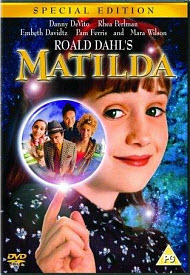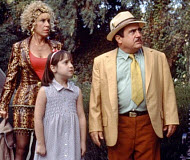Matilda
 for elements of exaggerated meanness and ridicule, and for some mild language.
for elements of exaggerated meanness and ridicule, and for some mild language.
Reviewed by: Don Bates
CONTRIBUTOR
| Moral Rating: | Average |
| Moviemaking Quality: |
|
| Primary Audience: | Teens |
| Genre: | Comedy Fantasy |
| Length: | 1 hr. 38 min. |
| Year of Release: | 1996 |
| USA Release: |
August 2, 1996 (wide—1,975 theaters) DVD: July 22, 1997 |



bad parenting
stealing in the Bible
child abuse

Adventures in the rainforest! Learn about the Creator of the universe by exploring His marvelous creation. Fun for the whole family with games, activities, stories, answers to children’s questions, color pages, and more! One of the Web’s first and most popular Christian Web sites for children. Nonprofit, evangelical, nondenominational.
| Featuring |
|---|
|
Mara Wilson … Matilda Danny DeVito … Mr. Wormwood Rhea Perlman … Mrs. Wormwood Embeth Davidtz … Miss Honey Pam Ferris … Trunchbull Paul Reubens … FBI Agent Tracey Walter … FBI Agent Brian Levinson … Michael Jean Speegle Howard … Miss Phelps See all » |
| Director |
|
Danny DeVito |
| Producer |
|
TriStar Pictures Jersey Films |
| Distributor |
| TriStar Pictures |
“Somewhere inside all of us is the power to change the world.”
On the surface, “Matilda” is an entertaining excursion through a child’s world of good vs. evil. Those bad guys are sooooo bad and Matilda’s bravery in conflict and eventual triumph are exciting and fun. A few scenes may be too scary for younger children and, though there is no cussing, the speech is occasionally very caustic.
The fun comes through the exaggerated circumstances and characters in the film. Danny DeVito and Rhea Perlman (Matilda’s father and mother) portray the ultimate in self-centered, dysfunctional, TV-addicted adult living. They don’t let Matilda go to school because they think she is four. She is really 6½. When stuck for a real answer to her valid arguments, daddy DeVito’s best response is “because I’m big, and you’re small. I’m smart, and you’re dumb. I’m right, and you’re wrong.”
She does get to school eventually, but it’s more of the same. The principal is a big, strong, surly woman who throws boys out of windows and swings a sweet young girl over a fence by her pigtails. It is cartoon-style violence; no one is ever really hurt. In the midst of her troubles, Matilda develops a “miraculous” power. This power, and her alliance with the good Miss Honey, allow her to overcome the evil and sever her ties to both the evil principal and her parents.
It is troubling that the evil portrayed in the movie originates in the natural authority of her parents and the authority of her school principal. Most children experience some degree of reaction to the authorities in their lives. Glamorizing this negative attitude toward parents and school and resolving it by separation sends a message that my children don’t need to hear.
This story is from Roald Dahl, the author of Charlie and the Chocolate Factory (“Willie Wonka”). Both films have simplistic charm and a lot of action. See “Willie Wonka”, skip “Matilda”.
See list of Relevant Issues—questions-and-answers.


PLEASE share your observations and insights to be posted here.

